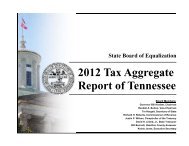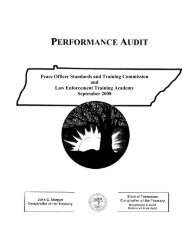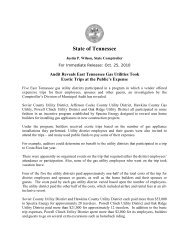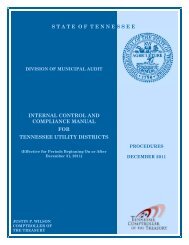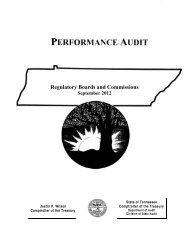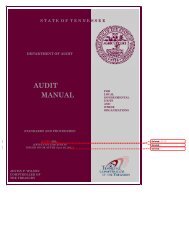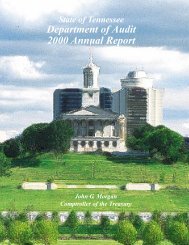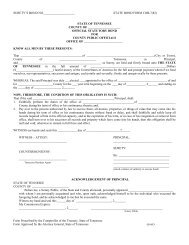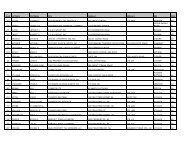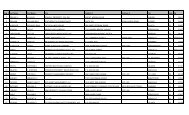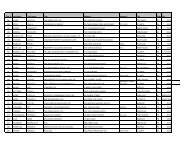On 06/30/2013 the Audit Manual was updated. For a markup copy ...
On 06/30/2013 the Audit Manual was updated. For a markup copy ...
On 06/30/2013 the Audit Manual was updated. For a markup copy ...
Create successful ePaper yourself
Turn your PDF publications into a flip-book with our unique Google optimized e-Paper software.
Reporting and <strong>Audit</strong>ing Requirements – Medicaid Cost Report Engagements - Section IJ<br />
Trust Funds–Criteria<br />
<strong>For</strong>matted: Indent: Left: 0", First line: 0"<br />
Medicaid recipients who are residents in nursing homes are permitted $50 per month for<br />
personal spending needs. The $50 is generally deducted from each recipient’s income, and <strong>the</strong><br />
remainder is applied to room and board charges. State Rule Chapter 1200-8-6 and Tennessee<br />
Code Annotated, Section 68-11-9<strong>06</strong> provide rules and regulations governing trust funds. The<br />
Nursing Facility <strong>Manual</strong>s provide guidance on <strong>the</strong> treatment of resident deposits.<br />
Sections 66-29-101 through 66-29-133, Tennessee Code Annotated, govern <strong>the</strong> disposition of<br />
balances owed to residents after <strong>the</strong>y have left <strong>the</strong> facility. Generally, <strong>the</strong> law requires nursing<br />
homes to report unclaimed property and credit balances to <strong>the</strong> State Treasurer each year.<br />
However, nursing homes may, at <strong>the</strong>ir option, elect to hold <strong>the</strong> funds for <strong>the</strong> statutory period<br />
from <strong>the</strong> date of last account activity before reporting to <strong>the</strong> State Treasurer. However, if <strong>the</strong><br />
nursing home holds <strong>the</strong> funds for <strong>the</strong> statutory period, <strong>the</strong>n it must document that it has made a<br />
reasonable attempt to locate <strong>the</strong> owner of <strong>the</strong> funds. At <strong>the</strong> end of <strong>the</strong> statutory period, any<br />
accrued interest must also be reported and returned to <strong>the</strong> State Treasurer.<br />
Generally, residents should not be charged for “covered services.” Covered services are items<br />
and services included in <strong>the</strong> per diem rate for all routine services. An exception is permitted<br />
when a resident or his or her doctor requests a special brand item not normally stocked by <strong>the</strong><br />
nursing home.<br />
Trust Funds–Procedures<br />
1. As of a specific date, balance <strong>the</strong> trust fund subsidiary accounts to <strong>the</strong> general<br />
ledger control account.<br />
2. Balance cash on hand and in bank to <strong>the</strong> general ledger control account.<br />
3. Select 10% of Medicaid trust fund accounts (minimum of 3, maximum of 10),<br />
and for <strong>the</strong> examination period, test each account for<br />
a. receipt of <strong>the</strong> monthly personal needs allowance;<br />
b. documentation that withdrawals are for personal needs only and not for<br />
covered services;<br />
c. placement of all funds in excess of $100 per recipient in an insured<br />
interest-bearing account.<br />
4. Check <strong>the</strong> trust fund accounts of deceased or discharged Medicaid recipients for<br />
credit balances.<br />
5. Examine <strong>the</strong> resident trust fund surety bond and determine if <strong>the</strong> amount of <strong>the</strong><br />
coverage is adequate to cover <strong>the</strong> account balance at any point during <strong>the</strong><br />
period.<br />
IJ-6



